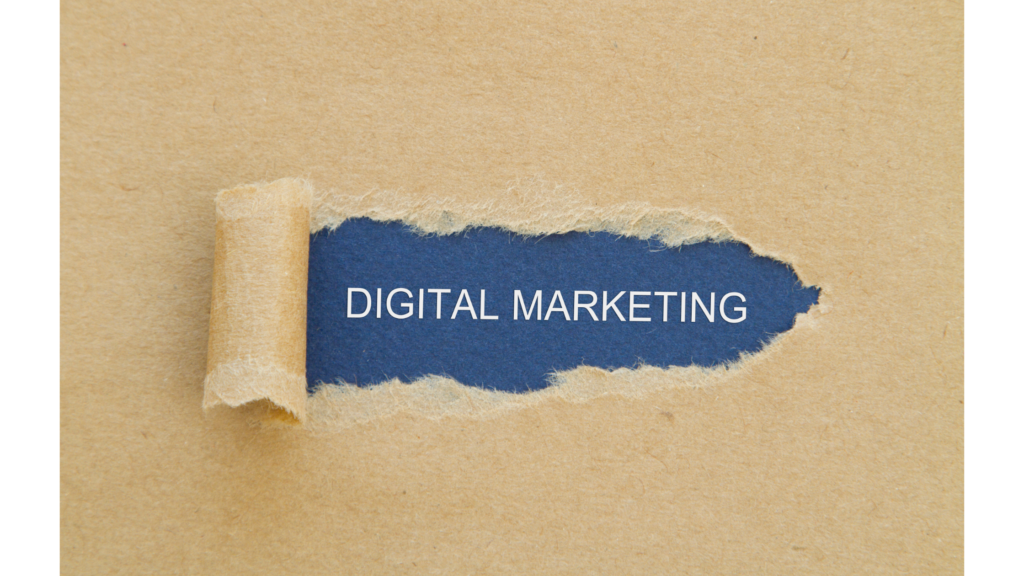Digital technologies have caused a sensational change in the showcasing capability inside the constantly changing setting of the current organization.
With the ascent of digital marketing, organizations currently have a vital device in their essential tool compartment to assist them with crossing the web-based world and communicating with their interest group in previously unheard-of ways.
This upset in contemplating, doing, and estimating showcasing has come about because of a central change from simple to digital strategies.
As we investigate the different features of digital marketing, this challenging field obviously utilizes a scope of techniques, all intended to exploit the potential that the advanced age offers.
Computerized showcasing encompasses a large number of procedures that assist associations with interfacing with buyers, shape their viewpoints, and prevail in the cutting-edge computerized scene.
These methodologies range from force to be reckoned with associations and content narration to search engine optimization accuracy and examination that give ongoing data.
How And Why Digital Marketing Strategies Have Evolved
Personalized Engagement vs. Mass Marketing
The transition from mass marketing to targeted, personalized engagement is the root cause of the evolution of modern marketing strategies.
The old ways of doing things ignored personal preferences in favor of reaching the widest potential audience with a uniform message. However, with the proliferation of digital channels, companies can now use data analytics and segmentation to target customers based on their demographics, interests, and actions.
This change guarantees that the target demographic will respond positively to advertisements.
Importance of Technology
The development of new technologies has spurred the expansion of marketing strategies. An increasingly interdependent world is the result of the widespread availability of mobile devices, social media, and the internet.
Due to the increase of instantaneous information, consumers are now more educated and selective than ever before. Take advantage of data analytics, AI, and automation to optimize campaigns, target the right audience, and enhance the overall customer experience with modern marketing strategies that leverage these technological advancements.
Dashboard Data and Measurable Return on Investment
Nowadays, marketers use real-time analytics to measure the success of their campaigns, unlike the old ways that had a hard time doing so.
By monitoring KPIs, user interactions, and conversion rates, businesses can now quickly assess the efficacy of their campaigns. Insights into consumer behavior, improved strategy on the fly, and optimized return on investment are all possible thanks to this data-driven approach.
Engaging and Interactive Content
An important step in marketing’s development has been the shift from one-way, static communication to two-way, interactive content. How companies interact with their target demographic has changed due to the proliferation of user-generated content, content marketing, and social media.
Marketers in the modern era try to meet the expectations of their customers by creating interactive campaigns that encourage real connections between brands and consumers through storytelling, multimedia content, and personalized experiences.
Multiple-Channel Strategy
A multi-channel strategy is highly valued in modern marketing. Social media, search engines, email, and mobile apps are just a few of the many channels via which consumers interact with brands.
Maintaining a constant brand presence and connecting with customers at any point in their digital journey are both made possible by a unified, cross-channel strategy. The rigid structure of many conventional advertising avenues stands in sharp contrast to this flexibility.
Building Relationships and Focusing on Customers
Relationship building and a focus on the customer are at the heart of contemporary marketing. Companies strive to create more than just transactional connections with their audience; they aim to build lasting relationships.
Integral parts of contemporary strategies that encourage brand loyalty and advocacy include personalization, feedback loops with customers, and loyalty programs.
How Digital Marketing Differs From Traditional Methods
The Conventional World of Marketing
Businesses used to rely on old-fashioned ways like print ads, billboards, TV ads, and direct mail in the old marketing environment. With little room for personalization, these channels aim high and capture a large audience.
Lacking access to real-time data on customer engagement, success measurement was frequently difficult. Conventional advertising was based on the one-way communication paradigm, in which companies spoke directly to unresponsive consumers.
The Revolution in Digital Marketing
Digital marketing, on the other hand, is a game-changer since it uses digital channels to reach specific demographics. It is possible to achieve an unprecedented level of accuracy by customizing messages according to demographics, behaviors, and preferences.
Digital marketing is characterized by interactivity, which allows brands and customers to communicate in two-way conversations using online platforms such as social media, email, and others. Marketers can quickly fine-tune their tactics for best outcomes with the use of real-time analytics, which offer fast insights.
Strategies that are Data-Driven and Measurable
The measurable nature of digital marketing is its most distinctive attribute. The ROI, conversion rates, and user engagements tracked by digital marketing are far more objective than those of more conventional, subjective techniques of campaign evaluation.
With this data-driven strategy, marketers can optimize their plans regularly. Digital analytics provide a level of granularity and accuracy in evaluating campaign performance that is often lacking in traditional techniques.
Accessibility and Cost-Efficiency
Saving money is another area where digital marketing really shines. The pay-per-click model guarantees that businesses only pay for real engagement, not just potential exposure, and online ads can be customized to match different budgets.
When compared to the prohibitively expensive nature of traditional advertising venues, digital marketing levels the playing field by making advertising accessible to businesses of all sizes.
Participation and Tailored Experiences
Personalization and interaction have taken center stage in the digital age. Businesses can establish genuine connections with their audience through email campaigns, social media, and content marketing.
Personalizing content according to each person’s tastes creates a bond and encourages loyalty. Digital marketing’s interactive and personalized experiences much outstrip those of more traditional tactics, even though the latter have their uses.
Businesses are embracing technology-driven tactics to interact, understand, and resonate with their target audience in ways that were unimaginable in the conventional marketing period.
This transformation is represented by the change from traditional to digital marketing.
Types Of Digital Marketing
Affiliate Marketing

In the world of online advertising, affiliate marketing has recently become a popular tactic. Affiliate marketing is based on the principle that firms can reach their target audience more effectively through the actions of influential individuals.
With their large internet followings, these influencers are crucial when it comes to companies promoting their products or services. Posts, blogs, or videos featuring their endorsement are all part of a larger strategy to increase the company’s visibility and attract new customers.
There is reciprocal value in the partnership between influencers and organizations. Companies benefit from the influencers’ already-established credibility and audience size, and the influencers, in turn, receive payment for the promotion they do.
The proliferation of popular video-sharing and photo-sharing websites like TikTok, Instagram, YouTube, and blogs has accelerated this partnership.
Content Marketing

An essential part of any digital marketing strategy, content marketing emphasizes building brand recognition through the deliberate dissemination of information and the telling of stories.
Articles, videos, podcasts, white papers, and other forms of multimedia content are all part of this comprehensive strategy. The main objective is to create value for customers, cultivating a long-term and reliable relationship that goes beyond just making sales.
Content marketing, in contrast to more conventional forms of promotion, aims to foster long-term consumer loyalty and a positive perception of the brand.
Merging content marketing with search engine optimization and social media platforms enhances its effectiveness. When content is updated and relevant, search engine rankings go up, which means more people in the target demographic can find the company online.
Also, you can make sure your digital strategy is consistent by reusing marketing content for things like social media posts and email campaigns.
Email Marketing

Due to its reliable history of attracting and keeping clients, email marketing continues to play a critical part in the realm of computerized publicizing.
In this day and age of numerous online media, email marketing provides a direct and personalized method of communication. Its effectiveness is immediately apparent when used in conjunction with content marketing strategies, which aim to share interesting stories and useful information in addition to promoting brands.
Significant execution markers incorporate the open rate, which shows the extent to which individuals opened an email, and the active clicking factor, which shows the number of individuals that tapped on joins inside the email.
Emails can be made more appealing by adding urgency, tailoring the content to the recipient, and giving them the option to choose how often they want to communicate with you.
Marketing Analytics

If you want to keep up with the ever-changing world of digital marketing, marketing analytics are essential. These investigations are vital on the grounds that they uncover commonsense data on the progress of missions, client activities, and computerized presence.
With regards to apparatuses that include action site execution, client commitment, and change measurements, Google Analytics is far superior to the opposition.
Advertisers need to jump into examples of client conduct and change techniques in light of their translation of information, which goes past essential numbers.
Nonstop mission streamlining, effective asset assignment, and variation to changing business sector elements involve the investigation-based vital dynamic cycle.
You might demonstrate your value to the business by showing how investigation-driven decisions assist you with arriving at your targets, amusing your clients, and incrementing your promoting ROI.
Mobile Marketing

An ever-evolving digital strategy, mobile marketing aims to reach the intended audience via mobile devices. This procedure looks to exploit individuals’ dependence on cell phones by using different channels, including instant messages, virtual entertainment, email, and savvy applications.
To make the association more significant and suitable, portable advertisers customize material based upon the client’s area and the specific second.
In light of statistics indicating a significant increase in the use of mobile devices, the significance of mobile marketing has increased for businesses seeking a more intimate and immediate connection with their audience.
For instance, 46% of respondents to a revealed review said they burn through five to six hours every day on their telephones. Furthermore, worldwide retail web-based business deals will outperform $5.7 trillion by 2022.
Pay-Per-Click (PPC)

Digital marketing models exist, and one of them is pay-per-click (PPC), in which sponsors are charged an expense at whatever point their advertisement is clicked.
Paid search marketing (PPC) is a quick and quantifiable way to support your internet-based permeability, yet it only endures a brief time. Web search tool results, sites, and YouTube are only a couple of the spots where you could see this sort of marketing.
The interest in specific watchwords influences both the expense and the degree of rivalry in pay-per-click (PPC) marketing. Catchphrases with a great deal of contest push-up costs, while phrases with less competition give more reasonable other options.
Pay-per-click (PPC) marketing is adaptable since it gives advertisers command over their cash and where their promotions show up. Publicists who need to augment their web-based permeability and draw in qualified guests should dominate the intricate details of pay-per-click (PPC).
SEO Search Engine Optimisation

One type of advanced advertising is SEO or Search engine optimization. Its objective is to increase a website’s organic traffic, also known as visitors discovered by search engines.
To further develop a site’s positioning in list items, search engine optimization predominantly expects to adjust the site’s substance, design, and significance with web crawler calculations. Content ordering, ensuring web search tools can comprehend your website’s substance, and an efficient connection design that crawlers can undoubtedly explore are the principal parts of search engine optimization.
Website streamlining, or watchword advancement, is the course of purposely involving significant terms in satisfied and meta-information to all the more likely match client search questions.
The always-changing nature of web index calculations is one of the numerous deterrents to SEO. Search engine optimization (SEO) specialists should continually change and work on their systems in light of the constantly changing calculations utilized by significant web search tools like Google.
It is essential to remain informed about these changes in order to maintain or enhance search rankings.
Social Media Marketing

Advancement of brands, connection with interest groups, and the enlistment of wanted activities are the three fundamental precepts of social media marketing (SMM (SMM). Utilizing online entertainment destinations like Facebook, Instagram, Twitter, and LinkedIn to spread content, draw in clients, and fabricate a brand is essential for social media marketing (SMM).
Consistency across stages and organizing online entertainment with general promoting targets comprise an incorporated and key methodology.
Examinations are fundamental in online entertainment advertising since they show how well missions are doing, how connected with clients are, and what it means for business objectives.
Advertisers can work on their systems and settle on choices in light of information by dissecting measurements like reach commitment and transformation rates.
The information shows that web-based entertainment showcasing meaningfully affects organizations, loaning assurance to its cases of advantage.
Online entertainment is currently a fundamental instrument for expanding brand perceivability and client commitment, as 86% of industry experts refer to expanded openness and 76% report improved site traffic.
A combination of imagination and logic is required for digital marketing strategies to succeed in today’s ever-changing social media landscape.
Conclusion
Flexibility and adaptability are fundamental characteristics for current firms to have in the steadily impacting universe of digital marketing.
The journey demonstrates this through multiple methods. Digital marketers require a widely inclusive arrangement that considers the complex web of social media marketing, mobile outreach, analytics-driven insights, content marketing, email campaigns, search engine optimization, pay-per-click advertising, and affiliate marketing.
Through the dynamic synergy that is created by the interaction of various kinds, businesses are able to interact with their target audience, connect with them, and establish relationships that last a lifetime.
One thing is certain, even though digital marketing is constantly evolving: Companies that want to succeed in today’s competitive digital market must be able to comprehend and apply numerous strategies.
Organizations must recognize the many elements of digital marketing to keep up with their pertinence, impact, and effect in the advanced, high-speed, computerized world.



